情态动词的特殊用法
情态动词的用法

情态动词的用法情态动词是英语中一类特殊的动词,它们用来表示说话人的态度、意愿、能力、推测以及提出请求等。
常见的情态动词包括can, could, may, might, must, shall, should, will, would等。
它们在句子中通常与其他动词连用,来表示某种情态或者意义。
本文将详细介绍情态动词的用法。
一、推测和可能性情态动词经常用于表达对事实的推测或者可能性。
在这种情况下,情态动词常与动词原形连用。
例如:1. He can swim.(他会游泳。
)- 表示他有游泳的能力。
2. She might be busy.(她可能很忙。
)- 表示对她忙碌的推测。
二、能力和批准情态动词还可以用来表示能力、技能以及请求或批准等。
下面是一些例子:1. She can play the piano.(她会弹钢琴。
)- 表示她有弹钢琴的能力。
2. You may leave now.(你现在可以离开了。
)- 表示对你离开的允许。
三、义务和必要性情态动词也被用来表示某种义务或者必要性。
下面是一些例子:1. Students must wear uniforms.(学生必须穿校服。
)- 表示学生有义务穿校服。
2. We should recycle.(我们应该回收。
)- 表示我们有责任进行回收。
四、猜测和推测情态动词有时用于表示对过去的推测或者猜测。
比较常见的是may have和might have。
例如:1. He may have forgotten the keys.(他可能忘记带钥匙了。
)- 表示对他忘记带钥匙的猜测。
2. They might have already left.(他们可能已经离开了。
)- 表示对他们离开的推测。
五、情态动词的否定形式和疑问形式情态动词的否定形式直接在情态动词前加not,疑问形式是将情态动词放在句首。
例如:1. I can't swim.(我不会游泳。
情态动词用法

情态动词用法情态动词是英语中的一类特殊动词,用来表示说话人对某种行为或状态的态度、推测、能力、可能性、建议等。
情态动词常常和动词原形搭配使用,具有一些特殊的语法和用法规则。
本文将详细介绍情态动词的基本用法和几种常见的情态动词。
一、情态动词的基本用法1. 表示能力:情态动词可以用来表示能力或技能。
常见的能力情态动词有can和could。
例如:- I can swim.(我会游泳。
)- She could play the piano when she was young.(她小时候会弹钢琴。
)2. 表示可能性:情态动词可以表示某种行为或状态的可能性。
常见的可能性情态动词有may、might和could。
例如:- It may rain tomorrow.(明天可能会下雨。
)- I might go to the party tonight.(我可能会去参加今晚的聚会。
)- He could be late for the meeting.(他可能会迟到会议。
)3. 表示推测:情态动词还可以用来表示说话人对某种事实的推测。
常见的推测情态动词有must、may、might和could。
例如:- He must be tired.(他一定很累。
)- They may be on vacation.(他们可能在度假。
)- She might have forgotten her keys.(她可能忘记带钥匙了。
)- It could snow tonight.(今晚可能会下雪。
)4. 表示允许和禁止:情态动词还可以表示某种行为的允许或禁止。
常见的允许情态动词有can、may和could,常见的禁止情态动词有mustn't和shouldn't。
例如:- You can go now.(你现在可以走了。
)- May I borrow your pen?(我可以借用你的钢笔吗?)- You mustn't smoke here.(你不能在这里抽烟。
情态动词在条件句中的特殊用法
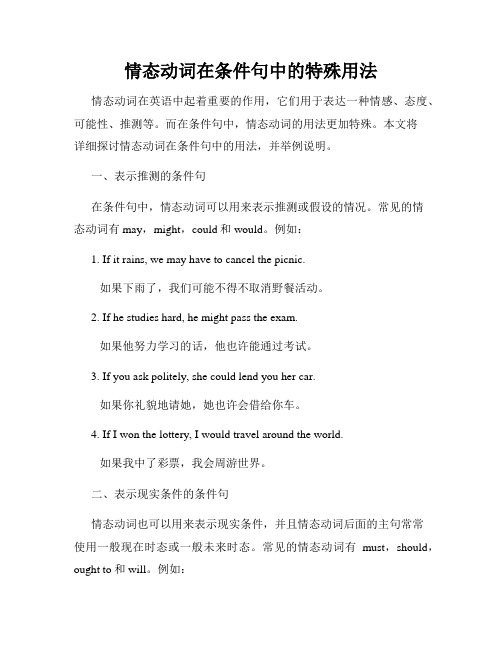
情态动词在条件句中的特殊用法情态动词在英语中起着重要的作用,它们用于表达一种情感、态度、可能性、推测等。
而在条件句中,情态动词的用法更加特殊。
本文将详细探讨情态动词在条件句中的用法,并举例说明。
一、表示推测的条件句在条件句中,情态动词可以用来表示推测或假设的情况。
常见的情态动词有may,might,could和would。
例如:1. If it rains, we may have to cancel the picnic.如果下雨了,我们可能不得不取消野餐活动。
2. If he studies hard, he might pass the exam.如果他努力学习的话,他也许能通过考试。
3. If you ask politely, she could lend you her car.如果你礼貌地请她,她也许会借给你车。
4. If I won the lottery, I would travel around the world.如果我中了彩票,我会周游世界。
二、表示现实条件的条件句情态动词也可以用来表示现实条件,并且情态动词后面的主句常常使用一般现在时态或一般未来时态。
常见的情态动词有must,should,ought to和will。
例如:1. If you want to succeed, you must work hard.如果你想成功,你必须努力工作。
2. If you need any help, you should ask for it.如果你需要帮助,你应该寻求。
3. If you want to be healthy, you ought to eat more vegetables.如果你想要健康,你应该多吃蔬菜。
4. If you come early, we will have plenty of time to chat.如果你早点来,我们会有充足的时间聊天。
情态动词用法归纳(全)
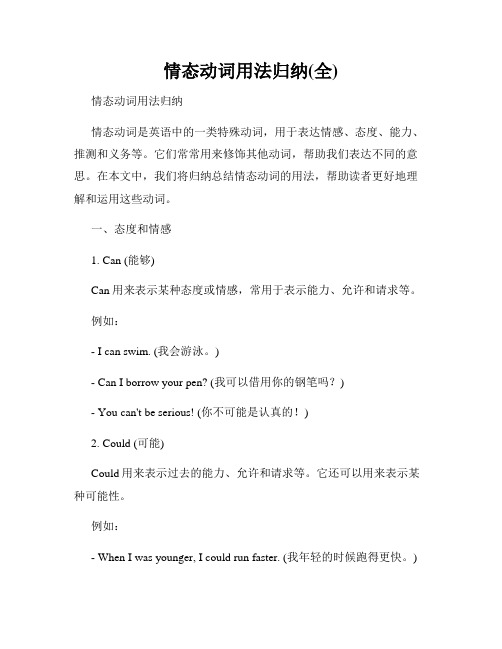
情态动词用法归纳(全)情态动词用法归纳情态动词是英语中的一类特殊动词,用于表达情感、态度、能力、推测和义务等。
它们常常用来修饰其他动词,帮助我们表达不同的意思。
在本文中,我们将归纳总结情态动词的用法,帮助读者更好地理解和运用这些动词。
一、态度和情感1. Can (能够)Can用来表示某种态度或情感,常用于表示能力、允许和请求等。
例如:- I can swim. (我会游泳。
)- Can I borrow your pen? (我可以借用你的钢笔吗?)- You can't be serious! (你不可能是认真的!)2. Could (可能)Could用来表示过去的能力、允许和请求等。
它还可以用来表示某种可能性。
例如:- When I was younger, I could run faster. (我年轻的时候跑得更快。
)- Could I ask you a question? (我可以问你一个问题吗?)- It could rain later, so bring an umbrella. (今天后面可能会下雨,所以带上雨伞。
)3. May (可能)May常表示许可、请求和推测等。
它还可以用来表示某种可能性或希望。
例如:- May I use your phone? (我可以用一下你的手机吗?)- It may rain tomorrow. (明天可能会下雨。
)- They may arrive late. (他们可能会迟到。
)4. Might (可能)Might与may的用法类似,但表示的可能性稍微低一些。
例如:- She might be busy. (她可能很忙。
)- I might go to the party, but I'm not sure yet. (我可能会去参加派对,但我还不确定。
)二、能力和推测1. Must (必须)Must用来表示强烈的推断或必要性。
情态动词的用法与情态词的区别

情态动词的用法与情态词的区别情态动词是英语中一类特殊的动词形式,用来表达说话人的意愿、能力、推测、建议等情态。
而情态词是指用来修饰动词、形容词和副词的词语,起到表达情感、程度或态度的作用。
本文将就情态动词的用法和情态词的区别进行详细探讨。
一、情态动词的用法情态动词在句子中有一定的特殊用法,一般具有以下几个特点:1. 情态动词本身没有人称和数的变化,即不受主语的影响。
例如,"can"在不同人称和数的情况下都保持不变,如"I can swim."和"We can swim."。
2. 情态动词后面加动词原形,不加"to"。
例如,"should do"而不是"should to do"。
3. 情态动词的否定形式是在情态动词前加"not",而不是加在动词后面。
例如,"cannot swim."而不是"can not swim."。
4. 情态动词可以用来表示说话人的意愿、能力、推测、建议等情态。
例如,"He can swim."表示他有能力游泳;"You should study hard."表示建议你要努力学习。
二、情态词的作用和区别情态词是一类用来修饰动词、形容词和副词的词语,用来表达情感、程度或态度。
情态词的作用主要体现在以下几个方面:1. 修饰动词:情态词可以修饰动词,表达说话人对某种行为或状态的态度、观点或感受。
例如,"I really love to travel."中的"really"表示说话人对旅行的热爱程度。
2. 修饰形容词:情态词可以修饰形容词,表示程度或态度。
例如,"She is very beautiful."中的"very"表示对她的美丽程度的强调。
情态动词的用法与情感表达

情态动词的用法与情感表达情态动词是英语中一类特殊的动词,用于表示说话人对某种行为、状态或情感的态度、意愿、推测等。
情态动词具有一些特殊的用法和结构,掌握这些用法可以使我们的表达更加准确、流畅。
本文将介绍情态动词的用法以及在情感表达中的应用。
一、情态动词的定义与用法情态动词包括can, could, may, might, shall, should, will, would, must 等。
它们通常与动词原形一起使用,表示说话人对某种行为、状态或情感的态度和意愿。
以下是它们常见的用法:1. 表示能力与可能性Can用于表达一种能力或可能性,表示某人具备某种能力或可能做某事。
例如:- He can swim.(他会游泳。
)- I can help you with your homework.(我可以帮你做作业。
)Could用于表示过去的能力或可能性,也可以用于委婉地提出请求。
例如:- When I was young, I could run very fast.(我年轻时跑得很快。
)- Could you please pass me the salt?(请你把盐递给我好吗?)2. 表示许可与禁止May和might用于表示许可,shall和should用于表示建议或命令。
例如:- May I go to the restroom?(我可以去洗手间吗?)- You should follow the rules.(你应该遵守规则。
)3. 表示推测与可能性Could, may和might用于表示推测、猜测或可能性。
例如:- He could be at home.(他可能在家。
)- It may rain tomorrow.(明天可能会下雨。
)4. 表示义务与建议Should和must用于表示义务、责任或建议。
例如:- We should protect the environment.(我们应该保护环境。
情态动词的用法及常见情态动词

情态动词的用法及常见情态动词情态动词是英语中一类特殊的动词形式,用来表示说话人对某个行为或状态的态度、推测、能力、可能性等。
它在句子中主要用来表达说话人的意愿、能力、推测以及可能性等语气。
下面将介绍情态动词的用法以及一些常见的情态动词。
一、情态动词的用法1. 表示能力:can, could, be able to情态动词can和be able to都表示能力。
can通常表示现在的能力,而be able to更强调一种可能性和解决问题的能力。
例如:- I can swim.(我会游泳。
)- She was able to solve the problem by herself.(她能够自己解决这个问题。
)2. 表示许可:may, can, could情态动词may, can, could都可以表示许可的意思。
may较正式,用于请求许可;can较口语化,表示一种可能性;could则表示一种客气委婉的许可。
例如:- May I use your computer?(我可以使用你的电脑吗?)- Can I have another piece of cake, please?(请再给我一块蛋糕好吗?)3. 表示推测:must, may, might情态动词must表示说话人对某个事实的肯定推测;may和might则表示可能性。
may较肯定,而might较委婉。
例如:- He must be tired, as he worked all day.(他一定很累,因为他整天都在工作。
)- She may/might be late.(她可能会迟到。
)4. 表示必须:must, have to情态动词must表示说话人对某个行为的强制性要求;have to则表示客观上的必须。
例如:- You must finish your homework before you go out.(你必须在出门前完成作业。
)- I have to go to work tomorrow.(我明天必须去上班。
情态动词在句子中的作用

情态动词在句子中的作用在英语语法中,情态动词是一类特殊的动词,用于表达态度、意愿、推测、能力等情态。
情态动词一般后接动词原形,本身没有人称和数的变化。
本文将探讨情态动词在句子中的作用及其相关用法。
一、情态动词的基本特点情态动词具有以下几个基本特点:1. 表达情感和态度:情态动词用于表达说话人的意图、态度、愿望等情感。
例如:- I can help you.(我可以帮助你。
)- You should apologize to him.(你应该向他道歉。
)2. 无词义:情态动词本身没有明确的词义,在句子中起到修饰、限制或强调其他动词的作用。
例如:- She may arrive late.(她可能会迟到。
)- They must finish their homework.(他们必须完成作业。
)3. 否定形式和疑问形式:情态动词的否定形式和疑问形式与其他动词不同。
例如:- They cannot swim.(他们不能游泳。
)- Can you meet me tomorrow?(明天你能见我吗?)二、情态动词的常见用法1. 表示能力和许可:can, could- Can I borrow your pen?(我可以借用你的钢笔吗?)- Could she speak French when she was young?(她年轻时会说法语吗?)2. 表示可能性和推测:may, might- He may arrive late.(他可能会迟到。
)- It might rain tomorrow.(明天可能会下雨。
)3. 表示义务和建议:must, should- Students must attend all the classes.(学生必须上所有的课。
)- You should try your best to succeed.(你应该尽力取得成功。
)4. 表示意愿和愿望:would, will- Would you like some tea?(你想要一些茶吗?)- I will help you with your project.(我会帮助你完成项目。
情态动词在虚拟语气中的特殊用法及其含义

情态动词在虚拟语气中的特殊用法及其含义
情态动词在虚拟语气中的特殊用法主要有以下几种:
1.“would rather +宾语从句”:这种结构中的从句使用虚拟语气,表示
“宁愿……”。
2.例如:I would rather you came tomorrow. 我宁愿你明天来。
3.“It is (high) time +从句”:这种结构中的从句也使用虚拟语气,表示
“是时候做某事了”。
4.例如:It is high time we did something about it. 我们早该对此采取一些
措施了。
5.“if only”:这个词也用于虚拟语气,表示“要是……就好了”。
6.例如:If only I had known! 要是我早知道就好了!
7.“would/could/might/should have done”:这些结构表示对过去情
况的虚拟。
8.例如:I wish she would have done what she was told to do. 我希望她
已经按照指示做了该做的事。
9.“needn’t have done”:这个结构表示“本来不必做而做了”。
10.例如:I needn’t have hurried,for the party didn’t start till 8 o’
clock. 我本来不必匆忙,因为晚会8点才开始。
这些情态动词的特殊用法在日常交流中十分常见,但具体使用还需要根据语境来判断。
希望以上信息对您有所帮助!。
情态动词的用法
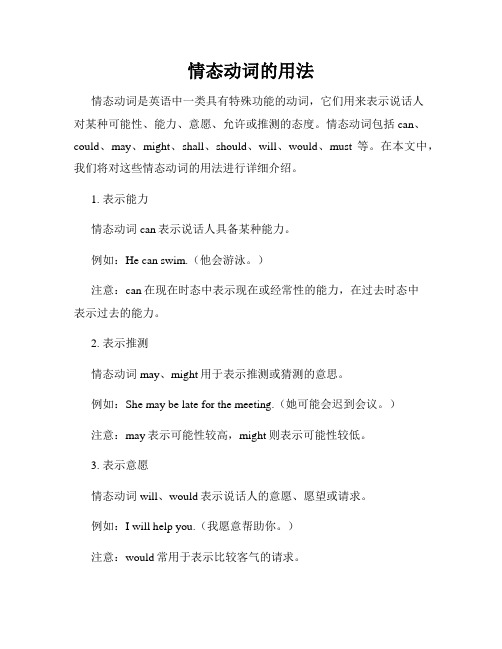
情态动词的用法情态动词是英语中一类具有特殊功能的动词,它们用来表示说话人对某种可能性、能力、意愿、允许或推测的态度。
情态动词包括can、could、may、might、shall、should、will、would、must等。
在本文中,我们将对这些情态动词的用法进行详细介绍。
1. 表示能力情态动词can表示说话人具备某种能力。
例如:He can swim.(他会游泳。
)注意:can在现在时态中表示现在或经常性的能力,在过去时态中表示过去的能力。
2. 表示推测情态动词may、might用于表示推测或猜测的意思。
例如:She may be late for the meeting.(她可能会迟到会议。
)注意:may表示可能性较高,might则表示可能性较低。
3. 表示意愿情态动词will、would表示说话人的意愿、愿望或请求。
例如:I will help you.(我愿意帮助你。
)注意:would常用于表示比较客气的请求。
4. 表示推测的过去情态动词must常用于表示对过去情况的推测或肯定。
例如:He must have missed the bus.(他肯定错过了公交车。
)注意:must用于表示对过去情况的肯定,而might用于表示对过去情况的推测。
5. 表示义务或必要性情态动词must表示对义务、必要性或确定性的肯定。
例如:You must finish your homework.(你必须完成作业。
)6. 表示建议或应该情态动词should表示建议或应该。
例如:You should go to bed early.(你应该早点睡觉。
)注意:should还可以表示对过去情况的推测,例如:He should have arrived by now.(他现在应该已经到达了。
)7. 表示允许或许可情态动词can与may可以用于表示许可或允许。
例如:Can I borrow your pen?(我可以借你的钢笔吗?)8. 表示可能性情态动词could用于表示可能性。
初中知识点归纳情态动词的特殊用法与句型转换
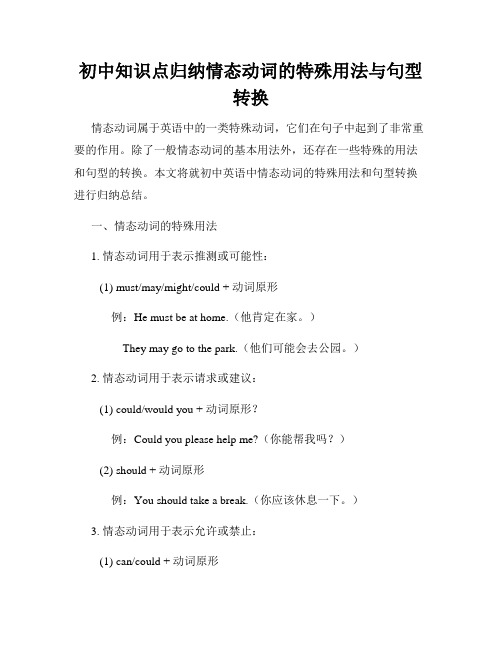
初中知识点归纳情态动词的特殊用法与句型转换情态动词属于英语中的一类特殊动词,它们在句子中起到了非常重要的作用。
除了一般情态动词的基本用法外,还存在一些特殊的用法和句型的转换。
本文将就初中英语中情态动词的特殊用法和句型转换进行归纳总结。
一、情态动词的特殊用法1. 情态动词用于表示推测或可能性:(1) must/may/might/could + 动词原形例:He must be at home.(他肯定在家。
)They may go to the park.(他们可能会去公园。
)2. 情态动词用于表示请求或建议:(1) could/would you + 动词原形?例:Could you please help me?(你能帮我吗?)(2) should + 动词原形例:You should take a break.(你应该休息一下。
)3. 情态动词用于表示允许或禁止:(1) can/could + 动词原形例:You can go now.(你可以走了。
)(2) must/mustn't + 动词原形例:You must finish your homework.(你必须完成作业。
)4. 情态动词用于表示能力或可能性:(1) can/could + 动词原形例:She can swim very well.(她游泳游得很好。
)(2) be able to + 动词原形例:He will be able to speak English fluently.(他将能够流利地说英语。
)5. 情态动词用于表示意愿或命令:(1) will/would + 动词原形例:I will do my best.(我会尽力的。
)(2) shall/should + 动词原形例:You shall obey the rules.(你应该遵守规则。
)二、句型转换1. 肯定句转否定句:将情态动词的原形后加上not。
情态动词的特殊用法

情态动词的特殊用法1. “Can”不只是表示“能”,老外在表达可能性的时候也常用它呀。
比如说“He can be very stubborn.”(他可能会非常固执)。
2. “Must”除了“必须”,它还能强调肯定推测呢。
就像“Look at that dark cloud. It must rain.”(看那片乌云,肯定要下雨啦)。
3. “Should”不仅仅是“应该”,有时候还表示委婉的建议哦。
像“Hey, you should try this cake. It's delicious.”(嘿,你真该试试这块蛋糕,超好吃的)。
4. “May”大家都知道是“可能”,可它还可以用于有礼貌地请求呢。
例如“May I come in?”(我可以进来吗?)。
5. “Could”除了是“can”的过去式,它也可以表示委婉的请求或建议呀。
像“Could you give me a hand?”(你能不能帮我一下呀?)。
6. “Would”不只是用在过去将来时,它还能用来表示客气的询问呢。
比如“Would you like some coffee?”(你想来点咖啡吗?)。
7. “Might”虽然不常用,但它也能表示比较小的可能性呢。
就像“She might come later.”(她可能晚点来)。
8. “Ought to”也是“应该”的意思,它的语气可比“should”更强哟。
好比“ You ought to finish your homework first.”(你应该先完成你的作业)。
9. “Need”当情态动词的时候是不是很特别?像“ You needn't do that.”(你不必那样做)。
情态动词的这些特殊用法是不是很有趣呀?它们能让我们的表达更加丰富多样,也更能准确传达我们的意思呢!。
英语情态动词的用法总结

英语情态动词的用法总结情态动词是英语中一类特殊的动词,用来表示说话者的态度、推测、可能性、能力、许可和义务等。
情态动词包括can、could、may、might、must、shall、should、will、would、ought to等。
下面是关于英语情态动词用法的总结。
1. 表示能力和可能性:- can/could:表示能力和可能性,用于表达某人有能力做某事或某事有可能发生。
例如:“I can swim.”(我会游泳),“She could come to the party.”(她可能会来参加派对)。
- may/might:表示可能性,用于表示某事有可能发生,程度较can/could稍弱。
例如:“It may rain tomorrow.”(明天可能会下雨),“He might win the competition.”(他有可能赢得比赛)。
2. 表示推测和猜测:- must:表示推测,用于表示某事几乎可以肯定或有极大的可能性。
例如:“He must be tired.”(他肯定累了),“She must have forgotten about the meeting.”(她肯定忘记了会议)。
- may/might:表示推测,用于表示某事有可能发生或存在。
例如:“She may be busy.”(她可能很忙),“They might not know the answer.”(他们可能不知道答案)。
3. 表示许可和建议:- can/could:表示许可,用于表示某事是被允许的。
例如:“Can I borrow your pen?”(我可以借你的笔吗?),“Could you open the window, please?”(请你能开窗户吗?)。
- may/might:表示许可,用于礼貌地请求或征求对方的意见。
例如:“May I ask you a question?”(我可以问你一个问题吗?),“Might I suggest an alternative?”(我可以提出一个替代方案吗?)。
高中英语知识点归纳情态动词与情态副词的特殊用法

高中英语知识点归纳情态动词与情态副词的特殊用法情态动词和情态副词在英语语法中扮演着重要的角色。
它们不仅能够表达说话者的态度和情感,还能够传达一些特殊的意义和信息。
在高中英语学习中,学生们需要对情态动词和情态副词的特殊用法有所了解。
本文将对高中英语中常见的情态动词和情态副词特殊用法进行归纳总结。
一、情态动词的特殊用法1. 表示推测和可能性情态动词can、could、may、might、must、should等可以用于表示对某种情况的推测和可能性。
例如:- He can be at home.(他可能在家。
)- It must be raining outside.(外面一定在下雨。
)2. 表示许可和请求表示许可的情态动词有can、could、may,表示请求的情态动词有can、could、may、would。
例如:- Can I go to the restroom?(我可以去洗手间吗?)- Could you please help me with my homework?(你能帮我做作业吗?)3. 表示能力和能够情态动词can和could可以表示能力和能够的意思。
例如:- She can speak three languages.(她能说三种语言。
)- Could you play the piano when you were a child?(小时候你会弹钢琴吗?)4. 表示义务和必要性情态动词must和should可以表示义务和必要性。
例如:- You must finish your homework before going out.(出去之前你必须完成作业。
)- She should apologize for what she said.(她应该为她说的话道歉。
)二、情态副词的特殊用法1. 表示程度和强调情态副词really、very、extremely等可以用于表示程度和强调。
情态动词特殊用法大集合
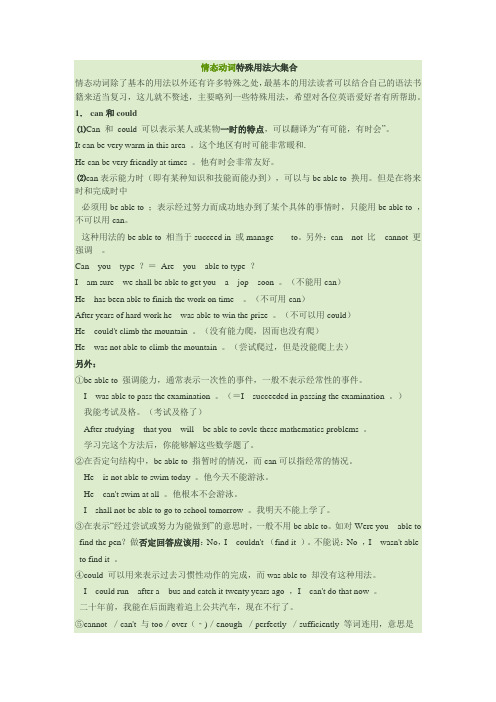
情态动词特殊用法大集合情态动词除了基本的用法以外还有许多特殊之处,最基本的用法读者可以结合自己的语法书籍来适当复习,这儿就不赘述,主要略列一些特殊用法,希望对各位英语爱好者有所帮助。
1.can和could⑴Can 和could 可以表示某人或某物一时的特点,可以翻译为“有可能,有时会”。
It can be very warm in this area 。
这个地区有时可能非常暖和.He can be very friendly at times 。
他有时会非常友好。
⑵can表示能力时(即有某种知识和技能而能办到),可以与be able to 换用。
但是在将来时和完成时中必须用be able to ;表示经过努力而成功地办到了某个具体的事情时,只能用be able to ,不可以用can。
这种用法的be able to 相当于succeed in 或manage to。
另外:can not 比cannot 更强调。
Can you type ?=Are you able to type ?I am sure we shall be able to get you a jop soon 。
(不能用can)He has been able to finish the work on time。
(不可用can)After years of hard work he was able to win the prize 。
(不可以用could)He could't climb the mountain 。
(没有能力爬,因而也没有爬)He was not able to climb the mountain 。
(尝试爬过,但是没能爬上去)另外:①be able to 强调能力,通常表示一次性的事件,一般不表示经常性的事件。
I was able to pass the examination 。
(=I succeeded in passing the examination 。
四个情态动词的特殊用法
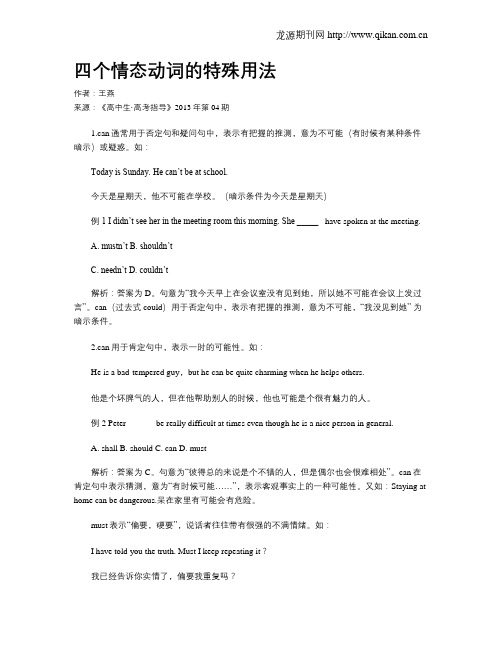
四个情态动词的特殊用法作者:王燕来源:《高中生·高考指导》2013年第04期1.can通常用于否定句和疑问句中,表示有把握的推测,意为不可能(有时候有某种条件暗示)或疑惑。
如:Today is Sunday. He can’t be at school.今天是星期天,他不可能在学校。
(暗示条件为今天是星期天)例1 I didn’t see her in the meeting room this morning. She ______ have spoken at the meeting.A. mustn’tB. shouldn’tC. needn’tD. couldn’t解析:答案为D。
句意为“我今天早上在会议室没有见到她,所以她不可能在会议上发过言”。
can(过去式could)用于否定句中,表示有把握的推测,意为不可能,“我没见到她” 为暗示条件。
2.can用于肯定句中,表示一时的可能性。
如:He is a bad-tempered guy,but he can be quite charming when he helps others.他是个坏脾气的人,但在他帮助别人的时候,他也可能是个很有魅力的人。
例2 Peter ______ be really difficult at times even though he is a nice person in general.A. shallB. shouldC. canD. must解析:答案为C。
句意为“彼得总的来说是个不错的人,但是偶尔也会很难相处”。
can在肯定句中表示猜测,意为“有时候可能……”,表示客观事实上的一种可能性。
又如:Staying at home can be dangerous.呆在家里有可能会有危险。
must表示“偏要,硬要”,说话者往往带有很强的不满情绪。
如:I have told you the truth. Must I keep repeating it?我已经告诉你实情了,偏要我重复吗?After I gave her my advice,she must go and do the opposite.在我给她建议之后,她偏要去并且做了相反的事。
情态动词的用法总结

情态动词的用法总结情态动词是一类特殊的动词,用来表示说话人对其中一种行为、状态或可能性的态度、判断、推测、愿望等情态。
情态动词有can,could,may,might,will,shall,should,would,must等。
它们在语法上有一些特殊的用法和用法限制。
以下是情态动词的用法总结:1.表示能力和许可:- Can/could:用来表示能力,做事的方式上拥有能力或技能。
例如:I can swim.(我会游泳。
)- May/might:用来表示允许或许可。
例如:May I go to the bathroom?(我可以去洗手间吗?)- Will/would:用来表示请求或许可。
例如:Would you please close the door?(你能关门吗?)2.表示推测和可能性:- May/might:用来表示推测、猜测或可能性。
例如:He may be at home.(他可能在家。
)- Could:用来表示一种可能性或假设的情况。
例如:He could bein the park.(他可能在公园。
)3.表示义务和必要性:- Must:用来表示义务、必要性或推测。
例如:You must finish your homework.(你必须完成作业。
)- Should:用来表示建议、责任或推测。
例如:You should apologize for your behavior.(你应该为你的行为道歉。
)4.表示愿望和偏好:- Would:用来表示过去或不太可能实现的愿望或偏好。
例如:I would love to go on vacation.(我很想去度假。
)需注意的是,情态动词具有一些特殊的用法和词语组合,例如情态动词后接动词原形、后接动词不定式的完成式形式等。
使用情态动词时需要根据具体语境和句子结构进行合理搭配与运用。
情态动词的用法和情态副词
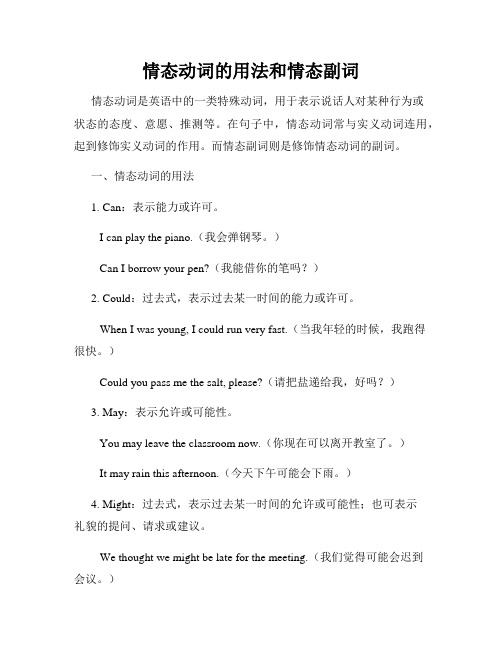
情态动词的用法和情态副词情态动词是英语中的一类特殊动词,用于表示说话人对某种行为或状态的态度、意愿、推测等。
在句子中,情态动词常与实义动词连用,起到修饰实义动词的作用。
而情态副词则是修饰情态动词的副词。
一、情态动词的用法1. Can:表示能力或许可。
I can play the piano.(我会弹钢琴。
)Can I borrow your pen?(我能借你的笔吗?)2. Could:过去式,表示过去某一时间的能力或许可。
When I was young, I could run very fast.(当我年轻的时候,我跑得很快。
)Could you pass me the salt, please?(请把盐递给我,好吗?)3. May:表示允许或可能性。
You may leave the classroom now.(你现在可以离开教室了。
)It may rain this afternoon.(今天下午可能会下雨。
)4. Might:过去式,表示过去某一时间的允许或可能性;也可表示礼貌的提问、请求或建议。
We thought we might be late for the meeting.(我们觉得可能会迟到会议。
)Might I ask you a question?(我可以问你一个问题吗?)5. Must:表示必须或肯定。
You must finish your homework before going out.(你必须在外出前完成作业。
)It must be cold outside.(外面肯定很冷。
)6. Should:表示应该或建议。
You should eat more fruits and vegetables.(你应该多吃水果和蔬菜。
)We should arrive at the airport early.(我们应该早点到机场。
)7. Would:表示过去意愿、假设、委婉的请求或建议。
情态动词的特殊用法
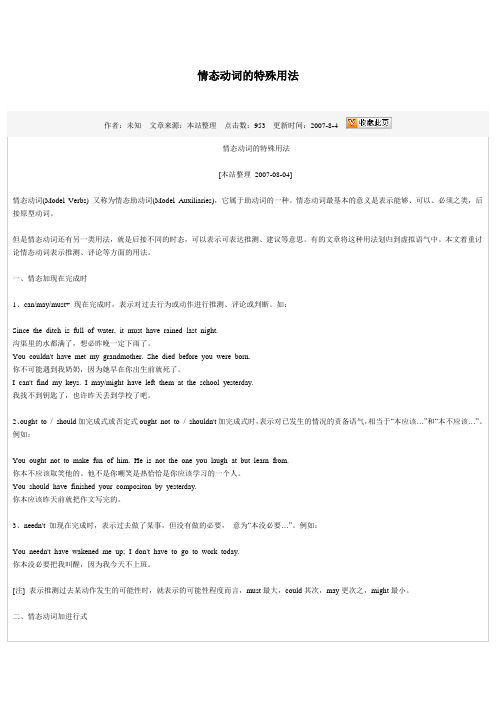
情态动词的特殊用法作者:未知文章来源:本站整理点击数:953 更新时间:2007-8-4情态动词的特殊用法[本站整理2007-08-04]情态动词(Model Verbs) 又称为情态助动词(Model Auxiliaries),它属于助动词的一种。
情态动词最基本的意义是表示能够、可以、必须之类,后接原型动词。
但是情态动词还有另一类用法,就是后接不同的时态,可以表示可表达推测、建议等意思。
有的文章将这种用法划归到虚拟语气中。
本文着重讨论情态动词表示推测、评论等方面的用法。
一、情态加现在完成时1、can/may/must+ 现在完成时,表示对过去行为或动作进行推测、评论或判断。
如:Since the ditch is full of water, it must have rained last night.沟渠里的水都满了,想必昨晚一定下雨了。
You couldn't have met my grandmother. She died before you were born.你不可能遇到我奶奶,因为她早在你出生前就死了。
I can't find my keys. I may/might have left them at the school yesterday.我找不到钥匙了,也许昨天丢到学校了吧。
2、ought to / should加完成式或否定式ought not to / shouldn't加完成式时,表示对已发生的情况的责备语气,相当于“本应该…”和“本不应该…”。
例如:You ought not to make fun of him. He is not the one you laugh at but learn from.你本不应该取笑他的。
他不是你嘲笑是热恰恰是你应该学习的一个人。
You should have finished your compositon by yesterday.你本应该昨天前就把作文写完的。
- 1、下载文档前请自行甄别文档内容的完整性,平台不提供额外的编辑、内容补充、找答案等附加服务。
- 2、"仅部分预览"的文档,不可在线预览部分如存在完整性等问题,可反馈申请退款(可完整预览的文档不适用该条件!)。
- 3、如文档侵犯您的权益,请联系客服反馈,我们会尽快为您处理(人工客服工作时间:9:00-18:30)。
情态动词的特殊用法1. _____ fired, your health care and other benefits will not be immediately cut off.A. Would you beB. Should you beC. Could you beD. Might you be2. —What’s the name? —Khulaifi. _____ I spell that for you? A. Shall B. Would C. Can D. Might3. John, look at the time. _____ you play the piano at such a late hour? A. Must B. Can C. May D. Need4. —Must I turn off the gas after cooking? —Of course. You can never be _____ careful with that.A. enoughB. tooC. soD. very5. Some aspects of a pilot’s job _____ be boring, and pilots often _____ work at inconvenient hours.A. can;have toB. may;canC. have to;mayD. ought to;must6. —When can I come for the photos? I need them tomorrow afternoon. —They _____ be ready by 12:00.A. canB. shouldC. mightD. need7. When he was there, he ___ go to that coffee shop at the corner after work every day.A. would B. should C. had betterD. might8. —Excuse me, but I want to use your computer to type a report. —You _____ have my computer if you don’t take care of it.A. shan’tB. might notC. needn’tD. shouldn’t9. You can’t imagine that a well-behaved gentleman _____ be so rude to a lady. A. might B. need C. should D. would10. Many people agree that _____ knowledge of English is a must in _____ international trade today.A. a;不填B. the;anC. the;theD.不填;the11. How _____ you say that you really understand the whole story if you have covered only part of the article?A. canB. mustC. needD. may12. The fire spread through the hotel quickly but everyone _____ get out. A. had to B. would C. was able to D. could13. There’s no light on — they ____ be at home. A. can’t B. mustn’t C. needn’t D. shouldn’t14. Tom, you _____ leave all your clothes on the floor like this! A. wouldn’t B. mustn’t C. needn’t D. may not15. _____ we never forget each other. A. May B. Can C. Must D. Should练习:1. Mr. Bush is on time for everything. How ____ it be that he was late for opening ceremony?A. can B. should C. may D. must2. Naturally, after I told her what to do, my daughter _____ go and do the opposite! A. may B. can C. must D. should3. It has been announced that candidates _______ remain in their seats until all the papers have been collected.A. canB. willC. mayD. shall4. “The interest ___________ be divided into five parts, according to the agreement made by both sides,” declared the judge.A. mayB. shouldC. mustD. shall5. You can’t imagine that a top student ______ have failed in the college entrance examination.A. mightB. needC. shouldD. would6. Football, as is known to the world, _______ be exciting and inviting. A. should B. might C. can D. will7. —_____ he open the door? —Yes, please. A. Shall B. Will C. Can D. Would8. The World Wide Web is sometimes jokingly called the World Wide Wait because it _____ be very slow.A. shouldB. mustC. willD. can9. —Isn’t that Ann’s husband over there? —No, it ______ be him-I’m sure he doesn’t wear glasses.A. can’tB. must notC. won’tD. may not10. It’s nearly seven o’clock. Jack _____ be here at any moment. A. must B. need C. should D. can11. What should we do if it _____ tomorrow? A. should snow B. would snow C. snow D. will snow12. You _____ use my bike on condition that you give it to me before I leave here. A. should B. must C. ought to D. shall常见的通常只能用主动语态的场合1. 当谓语动词是不及物动词,又不能构成动词短语接宾语时。
2. 当宾语是反身代词时。
如I hurt myself.3. 当宾语是相互代词时。
如We should learn from each other.4. 当宾语是不定式、动名词时。
如I want to watch TV. / They enjoy playing basketball.5. 当谓语动词是拥有、容纳类动词(have, hold)时。
如I have a big family. / The room can hold 40 people.6. 当谓语动词是开始、结束类动词(start, begin, stop, end, finish)时。
如The first class will start at 8:00. / The film ended whenI got there.7. 当谓语动词是开张、关门类动词(open, close)时。
如The shop usually opens before 8:30.8. 当谓语动词是花费类动词(take, cost)时。
如The new dress cost her 90 dollars.9. 当谓语动词是发生类动词(happen, take place)时。
如Something strange happened an hour ago.10. 当谓语动词是保持类动词(keep)时。
如The hall keeps quiet now.11. 当谓语动词是运动、变化类动词(leave, move, change)时。
如The train is leaving. / Things have changed a lot. / The car didn’t move.12. 当谓语动词是变得、成为类动词(become, get, turn)时。
如The teacher became angry. / The weather is getting warmer and warmer.13. 当谓语动词是…起来类动词时。
具体细分如下:○1半系动词(look, sound, feel, smell, taste)。
如The building looks very tall. / That piece of music sounds nice. / The dish smells delicious.○2其它类动词(eat, drink, cook, drive, work, read, write, sell, show, play, clean, wear, wash, burn等)。
如This kind of fruit eats crisp (脆). / Orange drinks sweet. / The car drives smoothly. / This text reads easily. / The pen writes well. / The clothes wash hard.14. 当宾语前有与主语一致的物主代词,且宾语名词为身体的一部分时。
